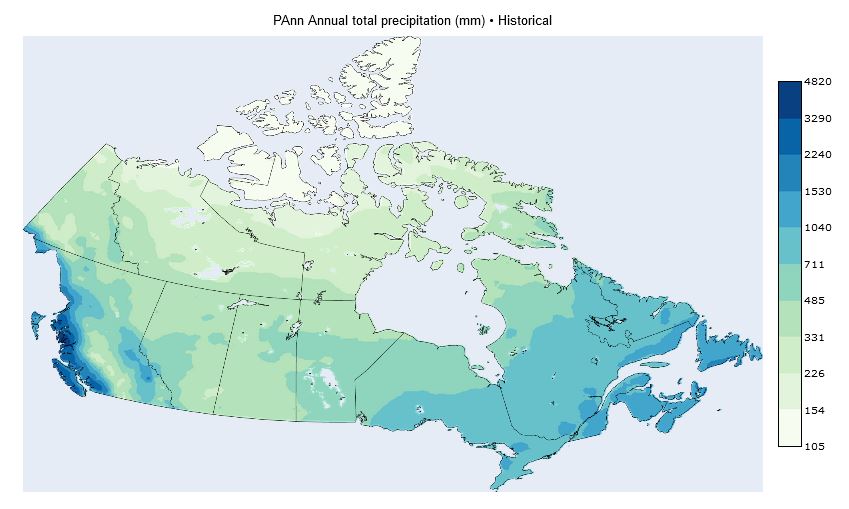Engineers, architects, planners, and other professionals use climatic variables when designing buildings and infrastructure. Increasingly, these professionals are asked to consider climate change in their designs. The Design Value Explorer is a new web-based, technical tool for accessing 19 climatic design values based on observed data and projections of how they may change in the future. This advisory tool allows professionals to examine how climate change will influence designs under different potential future scenarios. This tool is a result of collaborative efforts by Infrastructure Canada, the National Research Council of Canada (NRC), Environment and Climate Change Canada (ECCC), and the Pacific Climate Impacts Consortium (PCIC).
The Design Value Explorer provides design values on a map of Canada, or in a table for over 600 locations (the same format as Table C-2 in the National Building Code of Canada). It is unique in offering information on several specific variables that are not available through other climate services tools (for example: driving wind rain pressure, moisture index, design snow loads and wind pressures).
Another powerful feature of the Design Value Explorer is spatial interpolation. Using the tool’s map view, users can explore design values at specific weather stations and values for locations between stations. These interpolated data are based on state-of-the-art regional climate model simulations and are especially useful for communities and infrastructure projects that are located far from existing weather stations. All of the maps and tables generated by the tool can be downloaded for further use.
Applying projected data
Design professionals can benefit from using the Design Value Explorer to consider climate change risks, alongside the tools available through regional climate organizations and the Canadian Centre for Climate Services.
The information available through the Design Value Explorer is based on a careful assessment of both historical data and projections of future climate variables for Canada, and the informed use of this data is consistent with best practice design principles. The information has been developed with consideration of the variables that are used in the National Model Building Code of Canada and the Canadian Highway Bridge Design Code. Forward-looking climate data has not yet been fully reviewed for formal inclusion into updates to these codes by their responsible committees.
Future projections in the Design Value Explorer are presented at specified global warming levels in °C above a recent baseline period (1986-2016). To consider the future climate that an asset will experience, design professionals should use the data from the Design Value Explorer along with the planned service life of an asset and information on climate change scenarios (such as Representative Concentration Pathways).
Teamwork on data for climate resilience
From 2016 to 2021, with $42.5 million in financial support from Infrastructure Canada, the NRC undertook the Climate Resilient Buildings and Core Public Infrastructure (CRBCPI) initiative. Working with more than 200 collaborators, the CRBCPI initiative produced ground-breaking work to integrate climate resilience into building and infrastructure design, guides, and codes. The NRC continues to build upon the knowledge and partnerships established under its current Climate Resilient Built Environment (CRBE) initiative (2021-2026).
The CRBCPI initiative collaborators included both the PCIC and ECCC’s Canadian Centre for Climate Services. The PCIC is a regional climate service centre at the University of Victoria. It provides practical information on the physical impacts of climate variability and change in the Pacific and Yukon Region of Canada and participates in ECCC’s network of regional climate service providers. ECCC’s Canadian Centre for Climate Services aims to help Canadians by increasing resilience to climate change, improving understanding of how the climate is changing, and by providing a reliable source of information, which can help Canadians discover how these changes may affect their daily lives. The Canadian Centre for Climate Services also provides guidance and resources to help Canadians use this knowledge for making climate-smart decisions when planning for the future.
The PCIC developed the Design Value Explorer with funding support from the CRBCPI. The information presented by the Design Value Explorer was produced by PCIC in collaboration with the Climate Research Division of ECCC, the Engineering Climatology Unit of the Meteorological Service of Canada and the Construction Research Centre at the NRC. The data and the tool were developed as part of a significant research project to assess how climatic design data relevant to the National Building Code of Canada and the Canadian Highway Bridge Design Code might change as the climate continues to warm. A technical report on the project’s methodology and results is available from the Canadian Climate Data and Scenarios website.
Questions about the tool, including related webinars and training opportunities, can be directed to PCIC Support at [email protected].

